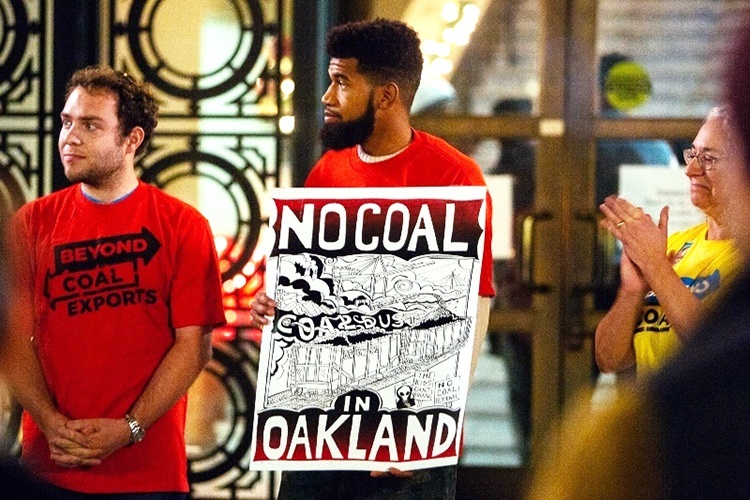
In the News
Oakland Council Bans Coal
-
Focus Areas
Chronic Disease Prevention, Environmental Health, Healthy Communities -
Issues
Asthma, Cancer, Climate Change -
Expertise
Public Policy Advocacy -
Programs
Center for Climate Change and Health

During a raucous four-hour meeting Monday night, the Oakland City Council voted unanimously to ban the storage and handling of coal and petroleum coke in the city.
Councilmember Desley Brooks was absent from the meeting.
Hundreds of people filled the council chambers, spilling into overflow rooms, and offered several hours of commentary frequently punctuated by cheers, applause and outbursts from audience members on both sides of the issue. Following the vote, audience members burst into song, filling the chambers with a chorus singing, “No more coal in Oakland, I’m going to let it shine.”
The vote came after more than a year of debate pitting environmental activists against business and community leaders, who claimed that without coal as a possible commodity, a planned bulk export terminal in West Oakland would be at risk of losing critical funding.
Staff released a long-anticipated report Friday, just three days before the vote, recommending the council ban coal storage and handling facilities in the city based on its findings that such a facility would pose a serious health risk to both workers at the planned terminal and West Oakland residents, who already suffer from high levels of asthma and other respiratory illnesses.
Councilmember Rebecca Kaplan called the vote “a proud day for democracy” in Oakland.
“I think what this vote proves is that we understand the importance of protecting the health and safety of our community,” Kaplan said. “It also shows that we were able to push back against the lies from the industry that were so deceptive.”
Kaplan was referring to a mailer sent to Oakland residents on the eve of the vote, which claimed, among other things, that local labor unions opposed the proposed coal ban and inaccurately represented the board of the Sierra Club, a vocal supporter of the ban, by omitting several non-white board members.
Though the ban on storing and handling coal pertains only to future projects, the council also voted unanimously on a resolution to apply the new rule to the planned Oakland Bulk and Oversized Terminal, a roughly 20-acre marine terminal situated within the 135-acre redevelopment of the former Army Base.
The council, in 2013, signed an agreement with developer Phil Tagami, who said at the time he would bring about 2,800 construction jobs and just over 2,000 permanent ones, replacing blue collar jobs lost when the base closed. The bulk terminal itself would create an estimated 120 permanent jobs and some 1,000 construction jobs, according to Jerry Bridges, CEO of Terminal Logistics Solutions (TLS), which has an exclusive option to operate the bulk terminal.
Coal was never mentioned as a commodity at the time, and the agreement did not specifically prohibit it. Since then, Tagami and Bridges have said they planned to export coal. And, the state of Utah in March passed a bill to invest $53 million of taxpayer money for a coal-shipping facility in Oakland.
That funding is not contingent on the terminal’s ability to store and handle coal, according to Harold Jones, a spokesman for TLS. Chase Thomas, a representative from the Alliance for a Better Utah, urged the council vote in support of the coal ban.
“Many Utahns agree with so many Californians and residents of the Oakland area in opposing coal,” he said.
Opponents of the ban pointed to the lack of middle-income jobs for West Oakland residents and the toll that poverty takes on a person’s health.
“Poor outcomes of health occur when there is a lack of jobs, increased crime, poorer education, low income and lack of transportation,” said Dr. H. Geoffrey Watson. “We’re dying more than anyone else.”
But Councilmember Noel Gallo said it was incumbent upon the council to protect residents’ health and Councilmember Abel Guillen called the tradeoff between jobs and the environment a “false choice.”
“It’s not just about making a dollar,” Gallo said. “It’s also about social responsibility.”
The rest of the council was equally unswayed, siding with proponents of the ban, who pointed to job opportunities in solar power and other renewable energy generation in Oakland, while emphasizing that the added pollution from coal dust would unduly burden workers and residents and the climate change impacts of burning coal shipped through the terminal would only further endanger Oaklanders.
“Climate change is the defining public health challenge of the century” said Dr. Linda Rudolph of the Public Health Institute.
City staff relied on a provision in the agreement that allows the council to apply new laws to the agreement if failing to do so would create a health hazard for workers or the public. In addition to a city-funded report by the Environmental Science Associates, Councilmember Dan Kalb commissioned an additional report by public health scientist Zoe Chafe, who reached similar conclusions that handling and storing coal at the facility would pose a danger to the public. At the meeting, Chafe said it was “inevitable” that workers, residents and visitors would be exposed to coal dust.
Continue reading the full article in the East Bay Times.
Read similar stories quoting Linda Rudolph by ABC7 News and Earth Island Journal.
Originally published by East Bay Times
More Updates
Work With Us
You change the world. We do the rest. Explore fiscal sponsorship at PHI.
Support Us
Together, we can accelerate our response to public health’s most critical issues.
Find Employment
Begin your career at the Public Health Institute.



